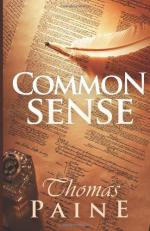In a former page I likewise mentioned the necessity of a large and equal representation; and there is no political matter which more deserves our attention. A small number of electors, or a small number of representatives, are equally dangerous. But if the number of the representatives be not only small, but unequal, the danger is increased. As an instance of this, I mention the following; when the Associators petition was before the House of Assembly of Pennsylvania; twenty-eight members only were present, all the Bucks county members, being eight, voted against it, and had seven of the Chester members done the same, this whole province had been governed by two counties only, and this danger it is always exposed to. The unwarrantable stretch likewise, which that house made in their last sitting, to gain an undue authority over the delegates of that province, ought to warn the people at large, how they trust power out of their own hands. A set of instructions for the Delegates were put together, which in point of sense and business would have dishonoured a schoolboy, and after being approved by a few, a very few without doors, were carried into the House, and there passed in behalf of the whole colony; whereas, did the whole colony know, with what ill-will that House hath entered on some necessary public measures, they would not hesitate a moment to think them unworthy of such a trust.
Immediate necessity makes many things convenient, which if continued would grow into oppressions. Expedience and right are different things. When the calamities of America required a consultation, there was no method so ready, or at that time so proper, as to appoint persons from the several Houses of Assembly for that purpose; and the wisdom with which they have proceeded hath preserved this continent from ruin. But as it is more than probable that we shall never be without a Congress, every well wisher to good order, must own, that the mode for choosing members of that body, deserves consideration. And I put it as a question to those, who make a study of mankind, whether representation and election is not too great a power for one and the same body of men to possess? When we are planning for posterity, we ought to remember, that virtue is not hereditary.
It is from our enemies that we often gain excellent maxims, and are frequently surprised into reason by their mistakes, Mr. Cornwall (one of the Lords of the Treasury) treated the petition of the New-York Assembly with contempt, because that House, he said, consisted but of twenty-six members, which trifling number, he argued, could not with decency be put for the whole. We thank him for his involuntary honesty. [Those who would fully understand of what great consequence a large and equal representation is to a state, should read Burgh’s political disquisitions.]
To conclude, however strange it may appear to some, or however unwilling they may be to think so, matters not, but many strong and striking reasons may be given, to shew, that nothing can settle our affairs so expeditiously as an open and determined declaration for independance. Some of which are,




